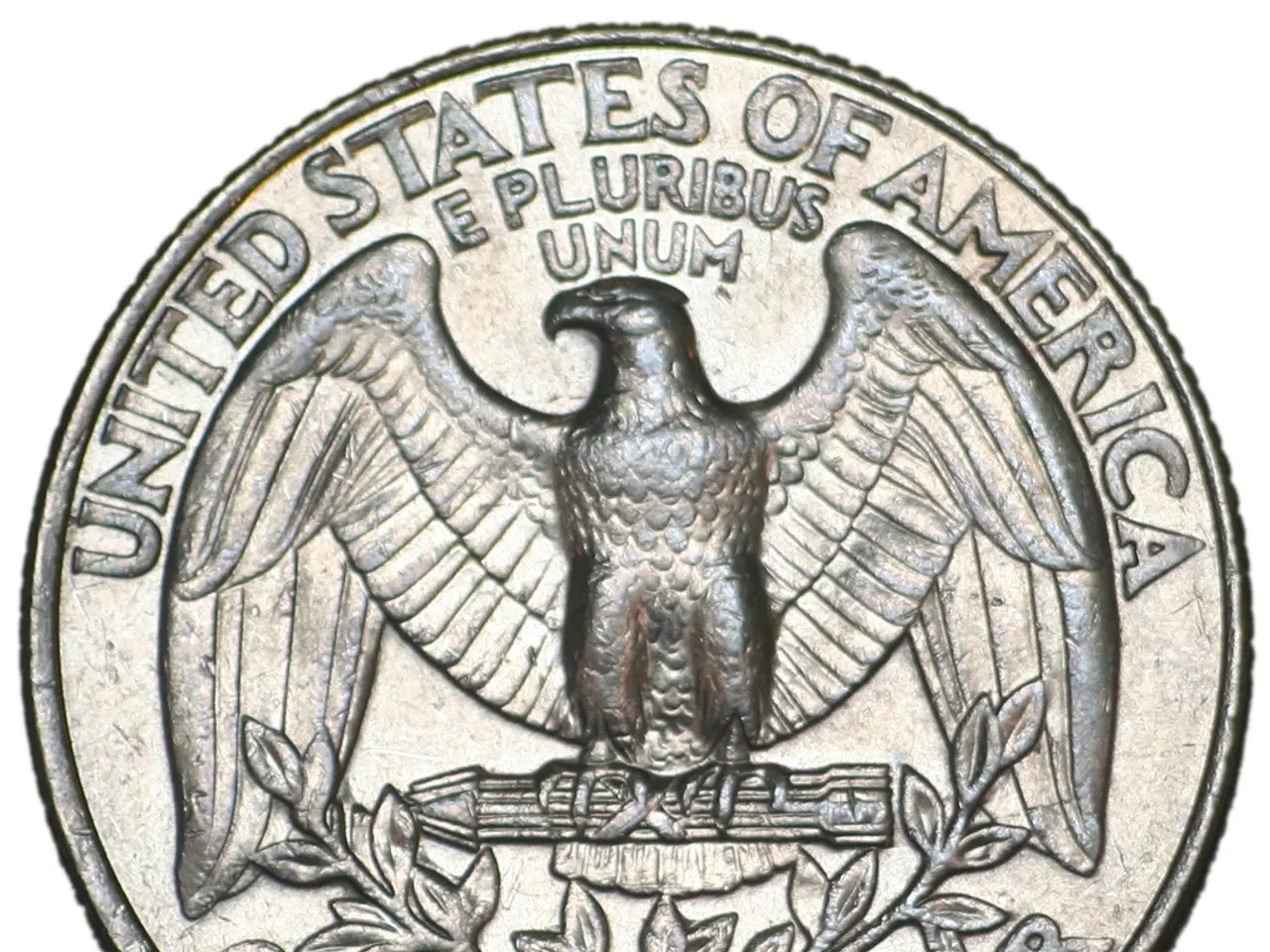"Remaking the Future," AfD, Russia, NATO: The Five Fault Lines of Strategic Unrest within the AfD
Strategic disputes within the AfD reveal five key triggers
Share on: Facebook | Twitter | WhatsApp | Email | Print | Copy Link
Maximilian Krah has ignited a fresh dispute within the AfD over the controversial term "Remaking the Future." However, the potential for conflict grows significantly with other topics. A roundup.
Recently, Krah found himself in hot water with far-right publisher Götz Kubitschek, as he was called upon for a podcast to justify his straying from the shared nationalist line. Krah aims to redefine his previously aggressive promotion of "Remaking the Future" in a much more moderate manner. His demand: The party should no longer suggest that mass immigration and its consequences could be reversed in any way.
Politics Immunity Lifted: Scrutiny of AfD politician Krah on Bribery Charges Krah's latest move might be surprising, but it aligns with the cunning and theatrical nature of the politician under investigation for bribery. His political playbook centers on generating maximum exposure through disruptive actions. Consequently, the AfD leadership has mostly downplayed Krah's statements, offering minimal response when they addressed the issue at all. Party leader Alice Weidel dismissed a rift and maintained radio silence on the matter.
But ignoring the issue isn't an option. Krah's initiative touches on one of the central internal tensions within the AfD that also includes the party's external political stance, social political positioning, and strategic orientation. A breakdown of the five most vital threads:
The AfD and "Remaking the Future"
Weidel attempted a propaganda sleight of hand during the Bundestag election campaign. Seizing the phrase “Remaking the Future,” popular among extremist elements within and outside the party, she simultaneously defined it: "All measures and incentives for the lawful and constitutional repatriation of expellees to their native countries."
Krah expressed to "Der Spiegel" that he also endorses this formulation. However, the problem remains that "the party's fringe" defines the term "Remaking the Future" using an "ethnic racial concept" and thereby poses constitutional issues, potentially leading to a ban.
With words like Kubitschek and Austrian far-right extremist Martin Sellner in mind, the term "fringe" refers to influential figures who support the party. Their reach extends deep into the party. For instance, when Thuringian state leader Björn Höcke speaks of the "autochthonous people," or the federal board member Hannes Gnauck argues that all Germans are connected by an "invisible bond," migrants are purposefully excluded from this bond.
Russia and Israel
The AfD has long been critical of Russia sanctions and the military aid provided to Ukraine. However, the party appears divided on this issue, with Weidel and Chrupalla representing the division. While Weidel is careful to avoid appearing overly friendly toward Moscow, Chrupalla openly advocates for Kremlin positions.
Politics AfD's Chrupalla under Fire for Meeting with Russian Embassy There have been several incidents. Weidel publicly criticized Chrupalla for attending the Russian embassy's reception in Berlin in 2023.
The conflict line often, though not always, runs between Western and Eastern alliances. This also applies to the relationship with Israel. When Chrupalla recently condemned Israel's military action against Iran, he risked confrontation with Weidel and her mentor, the honorary chairman Alexander Gauland.
Recently, the two party leaders at least attempted to mask their disagreement with a joint press release. They proclaim their agreement in condemning Chancellor Merz's statement about Israel doing "the dirty work" for "all of us" in Iran.
** military Service and NATO**
The dispute over foreign policy corresponds with the defense policy trigger point. Officially, the party supports mandatory military service, as outlined in its Bundestag election program. However, Chrupalla is a vocal opponent of conscription, especially in eastern regions, where the potential for being drafted into a conflict with Russia remains a significant concern.
Politics AfD Faces Calls for Second Expert Opinion on Ban "Key Questions Arise"
During the Bundestag election campaign, Weidel again upset party members by advocating for Germany to spend five percent of its GDP on defense. Meanwhile, Chrupalla has distanced himself from NATO. Now, the new foreign policy spokesman Markus Frohnmaier, along with other MPs, is attempting to draw the party closer to the USA and the Western alliance. But nothing is settled on the matter yet.
Marriage and Abortion
Weidel embodies the social political contradiction within the AfD in her personal life: A woman who lives in a lesbian relationship with a Sri Lankan-born woman and their children in Switzerland leads a largely conservative and nationalist party that explicitly shuns LGBTQ+ rights. At the latest party conference in Riesa, Weidel's family model was a subject of ridicule on stage. Afterward, the election program declared that the family as the building block of society consists of "father, mother, and children."
Politics AfD Causes Controversy with Migration Proposal
Weidel, at least, managed to prevent a majority at the party conference from adopting a proposal to significantly restrict the right to abortion. However, the furious battle over the issue is bound to resurface at the next program party conference.
** Power Strategy**
The goal is to seize government power, and everyone in the party agrees on that. However, the ongoing dispute over the strategy for achieving this goal has followed the AfD since its inception. Large parts of the "extremist fringe," as well as parts of the eastern state associations, are betting on a "conservative revolution." Höcke states this as follows: "When the time for change comes, the Germans won't make half-measures."
Weidel and her allies, on the other hand, are betting on working "through the institutions." Taking inspiration from the successes of Fratelli d'Italia under Prime Minister Giorgia Meloni and the French Rassemblement National under Marine Le Pen, they advocate for appearing more professional, speaking less extremist, and seeking common ground.
Still, the extreme fringe that warns of a "Melonization" remains strong within the party, forcing Weidel to adapt. The threads of conflict are numerous and often unpredictable in their impact. Nearly as unpredictable as Maximilian Krah.
Source: ntv.de
Enrichment Data: In case it's not already clear from the article, I'd like to elaborate on some of the main points and provide further context to ensure full comprehension:
- Remaking the Future - The ongoing debate within the AfD regarding immigration has been intensified by a controversy surrounding the phrase "Remaking the Future." This term has been linked to far-right extremist groups within and outside the party. Essentially, some members want to redefine the term to offer a more moderate perspective, rather than advocating for the mass expulsion of immigrants, potentially including naturalized citizen. This has created a rift in the party, with the more extremist members supporting a harsher stance.
- Russia - The internal division within the AfD on foreign policy, as it relates to Russia, is evident. While the German government maintains a stance supporting military aid to Ukraine, the AfD, represented by figures like Markus Frohnmaier, rejects this approach. They are critical of Germany’s confrontational policy toward Russia and advocate for a reevaluation of its geopolitical alignment and energy policies. This generates tension both within the party and with mainstream political forces.
- NATO - Although specific details about NATO aren't discussed in detail, the AfD's skepticism of military engagement, particularly related to Ukraine, suggests a broader questioning of NATO's strategies and Germany's commitment to the alliance’s confrontational policies.
- Marriage and Abortion - The AfD's social conservative beliefs and emphasis on traditional family values can lead internal disagreements regarding the promotion of these values in policy and rhetoric, though this isn't explicitly documented.
- Power Strategy - The AfD grapples with strategizing for government power, which has caused internal conflict since the party's inception. Figures like Björn Höcke advocate for a "conservative revolution," while Alice Weidel and her allies prioritize working "through the institutions" and adopting a less extremist public image to appeal to a wider audience. This division persists, and the party's strategy remains a subject of debate.
The Commission's proposed extension of the validity of the agreement covers the same duration as the agreement itself, creating a political matter of concern within the AfD. The ongoing dispute over the strategy for seizing government power within the AfD is a general-news topic that follows the party's internal tensions.
The AfD's divided stance on Russia's sanctions and military aid to Ukraine, with party leaders like Alexander Weidel and Jörg Meuthen representing opposite views, has political implications and adds to the strategic unrest within the party. The rapprochement between the US and the AfD, as indicated by the efforts of foreign policy spokesman Markus Frohnmaier and other MPs, raises questions about the AfD's foreign policy strategy and dependencies.







